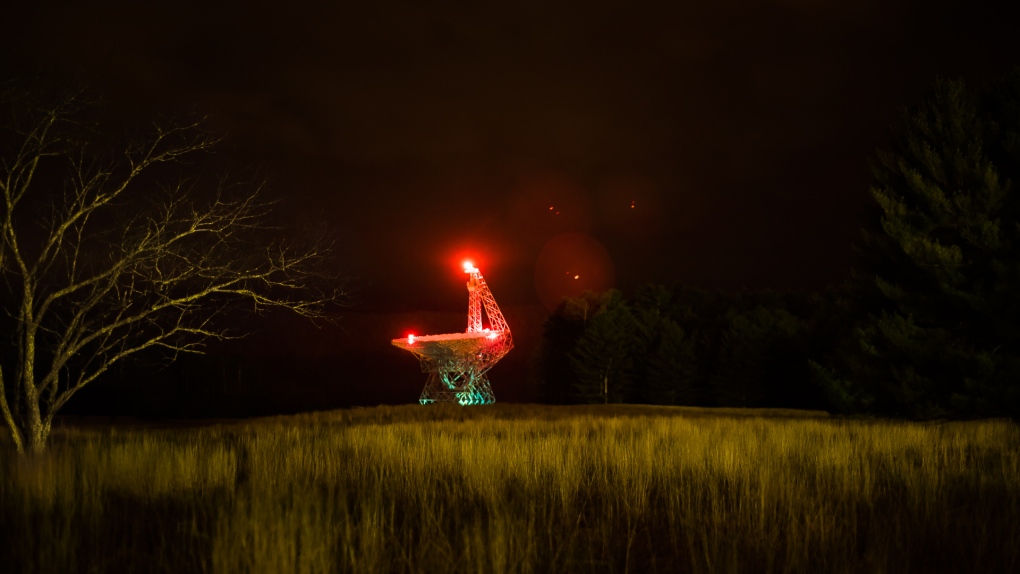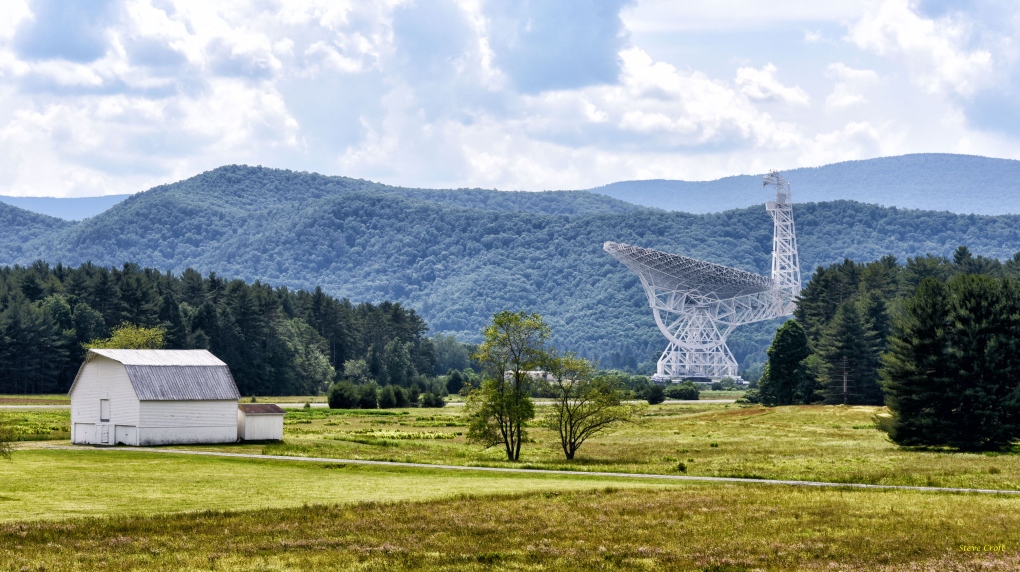Toronto student’s algorithm helps detect radio signals emitting from 5 distant stars
 An element of the Green Bank Telescope used to pinpoint radio signals from space is seen in this undated photograph. (Breakthrough Listen / Chris Schodt)
An element of the Green Bank Telescope used to pinpoint radio signals from space is seen in this undated photograph. (Breakthrough Listen / Chris Schodt)
A new artificial intelligence algorithm created by a Toronto student is helping researchers search the stars for signs of life.
Peter Xiangyuan Ma, a University of Toronto undergraduate student and researcher, said he started working on the algorithm while he was in Grade 12 during the pandemic.
“I was just looking for projects and I was interested in astronomy,” he told CTV News Toronto.
The idea was to help distinguish between technological radio signals created by human technologies and signals that were potentially coming from other forms of life in space.
“What we're looking for is signs of technology that signifies if the sender is intelligent or not. And so unsurprised to us, we keep on finding ourselves,” Ma explained. “We don't want to be looking at our own noisy signals.”
Using this algorithm, Ma said researchers were able to discover eight new radio signals being emitted from five different stars about 30 to 90 light years away from the Earth.
These signals, Ma said, would disappear when researchers looked away from it, which rules out, for the most part, interference from a signal originating from Earth. When they returned to the area, the signal was still there.
“We're all very suspicious and scratching our heads,” he said. “We proved that we found things that we wanted to find … now, what do we do with all these? That's another separate issue.”
- Download our app to get local alerts on your device
- Get the latest local updates right to your inbox
Steve Croft, Project Scientist for Breakthrough Listen on the Green Bank Telescope, the institute whose open source data was the inspiration for Ma’s algorithm, said that finding radio signals in space is like trying to find a needle in a haystack.
“You've got to recognize the haystack itself and make sure that you don't throw the needle away as you're looking at the individual pieces of hay,” Croft, who collaborated on Ma’s research, told CTV News Toronto.
 An image of the Green Bank Telescope is seen here. (Credit Breakthrough Listen / Steve Croft)
An image of the Green Bank Telescope is seen here. (Credit Breakthrough Listen / Steve Croft)
Croft said algorithms being used to discover these signals have to account for multiple characteristics, including the position they are coming from in the sky and whether or not the transmission changes over time, which could indicate if it’s coming from a rotating planet or star.
“The algorithm that Peter developed has enabled us to do this more efficiently,” he said.
The challenge, Croft says, is recognizing that false positives may exist despite a signal meeting this criteria. What could be signs of extraterrestrial life may also just be a “weirdly shaped bit of a haystack,” he added.
“And so that's why we have to go back and look again and see if the signal still there. And with these particular examples that Peter found with his algorithm, the signal was not there when we pointed the telescope back again. And so we sort of can't say one way or another, is this genuine?”
Researchers have been searching the sky for technologically-generated signals since the 1960s, searching thousands of stars and galaxies for signs of intelligent life. The process is called “SETI,” or “the Search for Extraterrestrial Intelligence.”
But interference from our own radio signals has always proven to be a challenge. Croft says most pieces of technology have some kind of Bluetooth or wireless wave element that creates static, resulting in larger amounts of data needed to be collected.
“That's a challenge but also computing provides the solution,” he said.
“So the computing and particularly the machine-learning algorithms gives us the power to search through this big haystack, looking for the needle of an interesting signal.”
Ma said that while we may not have found a “technosignal” just yet, we shouldn’t give up. The next step would be to employ multiple kinds of search algorithms to find more and more signals to study.
 Peter Ma is seen in this photograph taken in 2021. (Adar Kahiri)
Peter Ma is seen in this photograph taken in 2021. (Adar Kahiri)
While the “dream” is to find evidence of life, Ma says he is more focused on the scientific efforts of actively looking for it.
This sentiment is echoed by Croft, who said he is most fascinating in working towards answering the question of whether humans are alone in this universe.
“I don't show up to work every day, thinking I'm going to find aliens, but I do show up for work. So you know, I've got sort of some optimism.”
CTVNews.ca Top Stories

Trudeau acknowledges charges in Nijjar killing, calls for commitment to democracy
Prime Minister Justin Trudeau has acknowledged the charges laid Friday in relation to the murder of B.C. Sikh activist Hardeep Singh Nijjar.
No proof man lied to brother about number of kittens born in litter, B.C. tribunal rules
A man was denied a $5,000 payout from his brother after a B.C. tribunal dismissed his claim disputing how many kittens were born in a litter.
Bodies recovered in Mexico likely 2 Australians, 1 American who went missing: officials
Three bodies recovered in an area of Baja California are likely to be those of the two Australians and an American who went missing last weekend during a camping and surfing trip, the state prosecutor’s office said Saturday.
Princess Anne lays wreath at B.C. veteran's cemetery; receives 21-gun salute
Princess Anne paid tribute to veterans buried at a cemetery in British Columbia today, laying a wreath to honour the more than 2,500 military personnel and family members buried there.
Mystik Dan wins the 150th Kentucky Derby at Churchill Downs in a three-horse photo finish
Mystik Dan won the 150th Kentucky Derby in a photo finish, edging out Forever Young and Sierra Leone for the upset victory.
'I just can't believe that it took so long': Body found in wreckage 3 months after deadly fire
A man accused of arson in a January Old Strathcona apartment fire is expected to be charged with manslaughter after a body was discovered in the burned building late last month.
Quebec police hand out hundreds of tickets to Hells Angels and other bikers before 'first run' meeting
Quebec provincial police handed out hundreds of fines to Hells Angels members and other supporting motorcycle clubs who met for their 'first run' in a small town near Sherbrooke, Que.
Work stoppage possible as WestJet issues lockout notice to maintenance engineers' union
A lockout notice issued by WestJet to a union representing aircraft maintenance engineers could result in a work stoppage next week.
London Drugs begins 'gradual reopening' on 7th day after cyberattack
Almost a week after all London Drugs stores across Western Canada abruptly closed amid a cyberattack, they began a "gradual reopening" on Saturday.
































